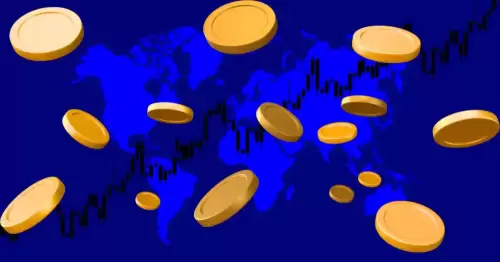 |
|
 |
|
 |
|
 |
|
 |
|
 |
|
 |
|
 |
|
 |
|
 |
|
 |
|
 |
|
 |
|
 |
|
 |
|
ICO(초기 코인 제공)의 강력한 수익은 암호화폐 공간에 큰 도움이 되며 이 주기에서 토큰 보유자에게 더 강력한 기반을 마련합니다.

The return of ICOs (Initial Coin Offerings) is a boon for the crypto space and strengthens the foundation for token holders in this cycle.
ICO(초기 코인 제공)의 반환은 암호화폐 공간에 도움이 되며 이 주기에서 토큰 보유자를 위한 기반을 강화합니다.
The story begins in 2010 when Naval, a prominent investor, saw an opportunity to involve retail investors in venture capital and democratize the asset class.
이야기는 저명한 투자자인 Naval이 소매 투자자를 벤처 캐피탈에 참여시키고 자산 클래스를 민주화할 기회를 보았던 2010년에 시작됩니다.
He launched AngelList, and by 2013, the platform had helped startups raise over $200 million.
그는 AngelList를 출시했고, 2013년까지 이 플랫폼은 스타트업이 2억 달러 이상을 모금하는 데 도움을 주었습니다.
AngelList's first product was an email list (hence the name) that connected startups with investors.
AngelList의 첫 번째 제품은 스타트업과 투자자를 연결하는 이메일 목록(따라서 이름)이었습니다.
This may sound silly and basic, but Naval was already highly influential in Silicon Valley, and several companies, including Uber, raised funds through this email list.
어리석고 기본적인 이야기처럼 들릴 수도 있지만, Naval은 이미 실리콘밸리에서 큰 영향력을 갖고 있었고 Uber를 포함한 여러 회사가 이 이메일 목록을 통해 자금을 조달했습니다.
In 2014, AngelList launched Syndicates, which was a turning point.
2014년 AngelList는 전환점이 된 Syndicates를 출시했습니다.
Syndicates shifted AngelList from a platform-centric investor model to a lead investor-centric model.
Syndicates는 AngelList를 플랫폼 중심 투자자 모델에서 주요 투자자 중심 모델로 전환했습니다.
Remember this distinction; it will be important later.
이 차이점을 기억하십시오. 나중에 중요해질 것입니다.
Due to adverse selection, equity crowdfunding never found PMF (Product-Market Fit) ------ why would a great startup that can raise funds from VCs want to raise funds from a random platform?
역선택으로 인해 주식 크라우드 펀딩은 PMF(Product-Market Fit)를 찾지 못했습니다. ------ VC로부터 자금을 조달할 수 있는 훌륭한 스타트업이 왜 무작위 플랫폼에서 자금을 조달하려고 할까요?
(Note: Adverse selection refers to a situation where one party has information advantages, leading the less informed party to make incorrect choices before a transaction occurs.)
(참고: 역선택은 한 당사자가 정보 우위를 갖고 있어 정보가 부족한 당사자가 거래가 발생하기 전에 잘못된 선택을 하게 되는 상황을 의미합니다.)
Syndicates completely overturned this idea by concentrating investments on a primary investor rather than on AngelList itself.
신디케이트는 AngelList 자체가 아닌 주요 투자자에게 투자를 집중함으로써 이러한 아이디어를 완전히 뒤집었습니다.
Syndicates provided leverage for angel investors who had deal experience but not necessarily capital.
신디케이트는 거래 경험은 있지만 자본이 필요하지 않은 엔젤 투자자에게 레버리지를 제공했습니다.
For example, John Smith is a very influential marketer that startup founders want to work with, but he lacks funds.
예를 들어 John Smith는 스타트업 창업자들이 함께 일하고 싶어하는 매우 영향력 있는 마케터이지만 자금이 부족합니다.
John Smith gets a $300,000 allocation in a hot deal. He invests $1,000, forms a syndicate, raises another $299,000, and then succeeds. Subsequently:
John Smith는 핫딜로 $300,000 할당을 받습니다. 그는 1,000달러를 투자하고 신디케이트를 구성하고 299,000달러를 추가로 모은 다음 성공합니다. 그후:
John Smith's syndicate members get pro-rata tokens in the deal.
John Smith의 신디케이트 회원은 거래에서 비례 토큰을 받습니다.
John Smith can now lead deals himself.
이제 John Smith가 직접 거래를 주도할 수 있습니다.
The startup gets a top marketer and a group of his friends to help them.
스타트업은 최고의 마케터와 그의 친구들의 도움을 받습니다.
AngelList gets a small carry on the syndicate (usually 1%).
AngelList는 신디케이트에서 약간의 수익을 얻습니다(보통 1%).
Everyone wins, and this simple product was the genesis of the massive wave of天使投资人 that followed.
모두가 승리하고, 이 단순한 제품이 뒤따른 天使投资人의 엄청난 물결의 기원이 되었습니다.
John Smith can now lead deals himself because he has proven deal experience and can get a large allocation in any follow-on round.
John Smith는 입증된 거래 경험을 갖고 있으며 후속 라운드에서 큰 할당을 받을 수 있기 때문에 이제 직접 거래를 주도할 수 있습니다.
This meant that startups had to give天使投资人good follow-on terms to keep them happy and engaged.
이는 스타트업이 행복하고 참여를 유지하기 위해 좋은 후속 조건을 제공해야 함을 의미했습니다.
Over time,天使投资人became more powerful than funds, and by 2018, funds were largely shut out of early-stage venture capital.
Over time,천사 투구인became more powerful than funds, and by 2018, funds were largely shut out of early-stage venture capital.
Anyway… back to the crypto space.
어쨌든… 암호화폐 세계로 돌아갑니다.
In 2016, I moved to San Francisco to work on the venture capital team at AngelList and started trading cryptocurrencies everywhere, but that’s not the focus.
2016년에 저는 AngelList의 벤처 캐피탈 팀에서 일하기 위해 샌프란시스코로 이주했고 모든 곳에서 암호화폐 거래를 시작했지만 그게 초점이 아닙니다.
Besides startup equity, venture capital funds are also subject to regulatory restrictions, making public offerings challenging.
스타트업 자산 외에도 벤처 캐피털 펀드도 규제 제한을 받기 때문에 공모가 까다롭습니다.
However, Naval became a true crypto believer earlier than most, spinning off CoinList from AngelList in 2017 to focus on cryptocurrencies.
그러나 Naval은 암호화폐에 집중하기 위해 2017년 AngelList에서 CoinList를 분리하면서 대부분의 사람들보다 일찍 진정한 암호화폐 신자가 되었습니다.
CoinList's mission is to build a seamless, compliant way for companies to conduct their token offerings.
CoinList의 임무는 기업이 토큰 제공을 수행할 수 있는 원활하고 규정을 준수하는 방법을 구축하는 것입니다.
Interestingly, CoinList did not face the adverse selection issues that AngelList encountered, so it remained platform-centric.
흥미롭게도 CoinList는 AngelList가 직면한 역선택 문제에 직면하지 않았기 때문에 플랫폼 중심을 유지했습니다.
While a rapidly growing seed-stage SaaS company has no interest in 1,000 retail supporters, every company in the crypto industry wants as many supporters as possible.
빠르게 성장하는 초기 단계의 SaaS 회사는 1,000명의 소매 지지자에게 관심이 없지만 암호화폐 업계의 모든 회사는 가능한 한 많은 지지자를 원합니다.
CoinList found true PMF from day one, with its first client being Filecoin, which raised $200 million, and that says it all.
CoinList는 첫 번째 클라이언트인 Filecoin과 함께 첫날부터 진정한 PMF를 찾았으며, 이는 2억 달러를 모금했으며 이것이 전부입니다.
In that cycle, there were some decent projects like Stacks selling, but by Q2 2018, the situation took a sharp turn.
그 주기에는 스택스 매각과 같은 괜찮은 프로젝트도 있었지만 2018년 2분기에 상황은 급격하게 바뀌었습니다.
CoinList went over a year without earning any revenue from token sales, and the situation was dire.
코인리스트는 토큰 판매로 인한 수익을 얻지 못한 채 1년이 넘도록 상황이 심각했습니다.
I (the author of this article), Mike Zajko (former CoinList sales director), and other CoinList members would head to the bar on Friday afternoons, downing six pints of Guinness and pondering what they were doing.
나(이 기사의 저자), Mike Zajko(전 코인리스트 영업 이사) 및 다른 코인리스트 회원들은 금요일 오후에 바에 가서 기네스 6파인트를 마시고 그들이 무엇을 하고 있는지 숙고하곤 했습니다.
But the market recovered, and by the end of 2019, the team wanted to issue tokens again. They quickly helped launch ALGO, NEAR, SOL, and several other tokens.
하지만 시장이 회복되었고, 2019년 말까지 팀은 토큰을 다시 발행하기를 원했습니다. 그들은 신속하게 ALGO, NEAR, SOL 및 기타 여러 토큰 출시를 도왔습니다.
The token sale product was largely the same ------ the team still wanted as many token holders as possible.
토큰 판매 제품은 대체로 동일했습니다. ------ 팀은 여전히 가능한 한 많은 토큰 보유자를 원했습니다.
The biggest difference was that, so far, most lawyers told the team to completely avoid the U.S. Thus, these were all sales excluding Americans.
가장 큰 차이점은 지금까지 대부분의 변호사들이 팀에게 미국을 완전히 피하라고 지시했기 때문에 이는 모두 미국인을 제외한 매출이었습니다.
CoinList experienced ups and downs but launched a series of tokens that made users a lot of money.
CoinList는 기복을 경험했지만 사용자에게 많은 돈을 벌어주는 일련의 토큰을 출시했습니다.
Ultimately, if you’re in this industry, that’s the KPI.
궁극적으로 이 업계에 종사한다면 그것이 바로 KPI입니다.
Starting in 2022, the game shifted from token sales to airdrops.
2022년부터 게임은 토큰 판매에서 에어드랍으로 전환되었습니다.
Once OP and ARB abandoned public token sales, most blue-chip teams issuing tokens listened
OP와 ARB가 공개 토큰 판매를 포기한 후 토큰을 발행하는 대부분의 블루칩 팀은 귀를 기울였습니다.
부인 성명:info@kdj.com
제공된 정보는 거래 조언이 아닙니다. kdj.com은 이 기사에 제공된 정보를 기반으로 이루어진 투자에 대해 어떠한 책임도 지지 않습니다. 암호화폐는 변동성이 매우 높으므로 철저한 조사 후 신중하게 투자하는 것이 좋습니다!
본 웹사이트에 사용된 내용이 귀하의 저작권을 침해한다고 판단되는 경우, 즉시 당사(info@kdj.com)로 연락주시면 즉시 삭제하도록 하겠습니다.
-

-

-

-

- 트럼프의 새로운 암호 화폐
- 2025-05-09 18:35:12
- 빌 클린턴 전 대통령의 중국 기증자 인 조니 정 (Johnny Chung) 은이 약정을 설명했다.
-

-

-

-

- 트럼프 동전 : 트럼프 가족을 상당히 부유하게 만들 수있는 암호 화폐 벤처
- 2025-05-09 18:25:13
- 취임 전날 트럼프 대통령은 자신의 암호 화폐 인 트럼프 코인을 발표했다.
-






























































